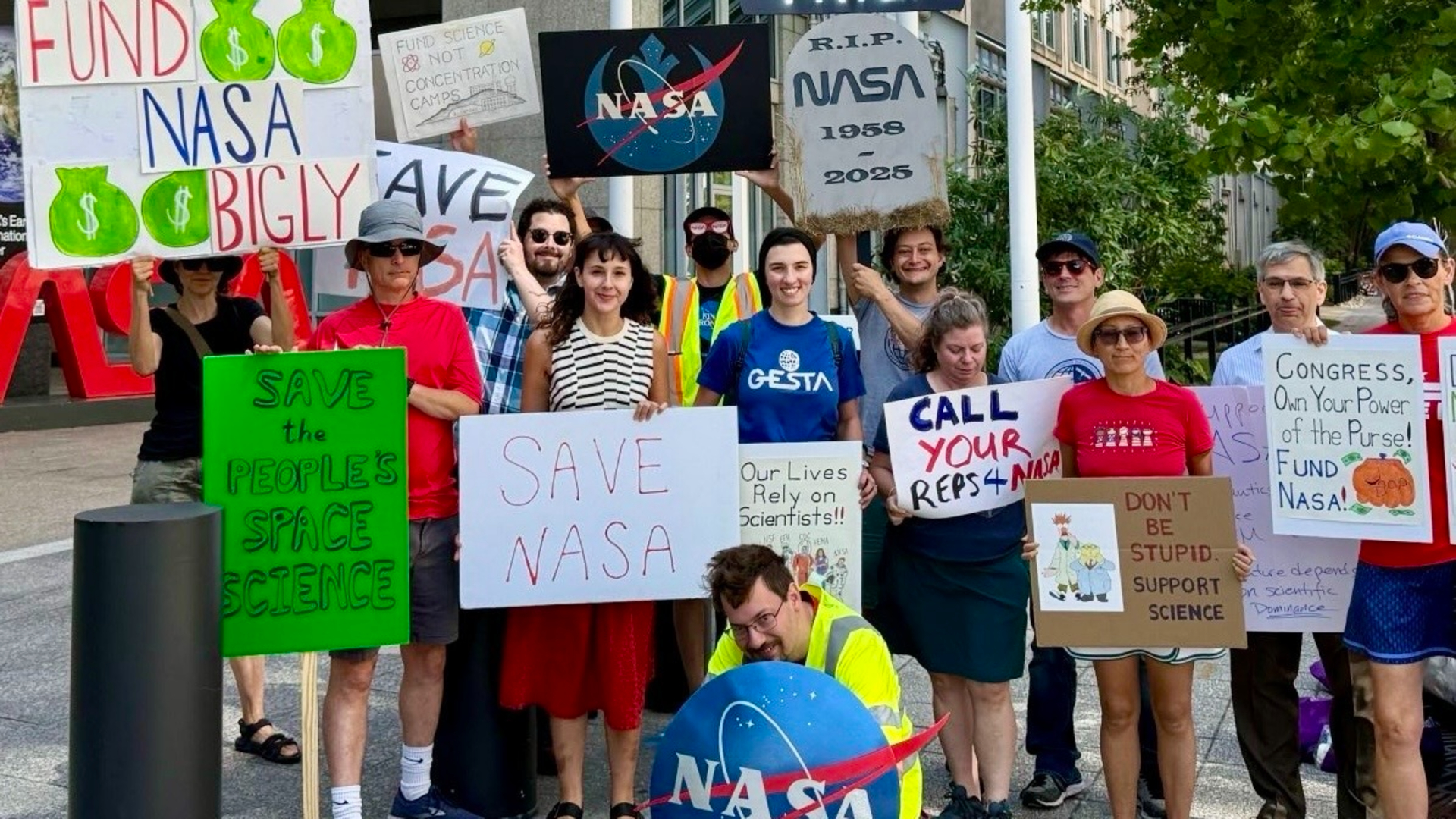‘We have to fully fund NASA’: Lawmaker joins space agency employees in protest outside DC headquarters

Chants of “Save NASA!” echoed through downtown Washington, D.C., Monday(Sept. 15) as agency workers and supporters rallied outside NASA headquarters. Carrying signs and repeating calls, protestors urged lawmakers to protect the space agency’s future.
It was the third such demonstration this summer, and part of a campaign organized by NASA Needs Help that the group says is growing as the budget fight intensifies. Demonstrators warned that layoffs, mission shutdowns and the loss of union rights are already sinking morale and threatening safety across NASA centers.
Protestors argued that the agency is being hollowed out before Congress finalizes NASA’s next budget, and that the damage to science and the U.S. space program could be irreparable. “Like other federal employees, the people of NASA have suffered months of attacks on their work,” one protest organizer, Helen, who did not provide a last name, told the gathered crowd through a microphone. “They’ve endured shortsighted decisions, paralyzing uncertainty, and a steady erosion of the very expertise that makes these missions possible.”
At the center of their concerns is President Donald Trump’s proposed fiscal year 2026 (FY 26) budget. The White House’s plan would reduce NASA’s overall funding by nearly a quarter, slash science programs almost in half, and cancel 41 active or planned science missions, including spacecraft already operating in Earth orbit and beyond.
Protestors warn that those cuts threaten not just individual projects but also NASA’s position as the world leader in science and innovation. Several in attendance Monday took the opportunity to address the crowd, arguing that canceling active missions wastes taxpayer dollars already spent and undermines relationships with international partners who have invested their own time and resources in such projects.
Colette Delwalla, executive director of Stand Up For Science, framed the threat as an attack on American ideology. “NASA is a tangible product of the greatest expression of the American dream,” she said. “All of humanity has mused about reaching into the stars, and through decades of unified support by Congress, by presidents and the American public, we’ve done it. Dismantling this American institution is a travesty that no one voted for.”
Delwalla argued that the U.S. is on the verge of relinquishing its global leadership in science, “in exchange for tax cuts for the ultrawealthy.”
“We didn’t accidentally land on the moon,” Delwalla said. “We did it through unified investment in science, and we cannot separate the benefits of science from that investment.”
But those benefits are already walking out the door. Since January, at least 4,000 employees have departed NASA through layoffs, early retirements and voluntary separations through the Trump administration’s deferred resignation programs (DRPs). Protestors fear that includes an institutional knowledge base that may not be recoverable.
The group’s pleas haven’t gone unnoticed on Capitol Hill. Rep. Suhas Subramanyam (D-Va.), a member of the House Science, Space and Technology Committee, addressed protestors Monday, telling the crowd that the people at NASA are central to U.S. leadership.
“NASA is one of the best investments we can make in our country, and NASA’s workforce is critical to making our country great,” he said. “We have to fully fund NASA in our budget, return those 4,000 jobs back to NASA and continue to support science all across this country.”
The protest also spotlighted an Aug. 28 executive order signed by Trump that eliminated collective bargaining rights at NASA and a handful of other federal agencies in the name of national security. Union representatives at Monday’s demonstration said the order has already forced the cancellation of contracts, the closure of union offices and an end to payroll dues contributions.
An area vice president for the Goddard Engineers, Scientists and Technicians Association (GESTA), Monica Gorman, said the order is creating a climate of uncertainty and fear. She warned that undermining unions isn’t only about job protections — it directly threatens mission safety as well.
Gorman pointed to past tragedies like the Apollo 1 fire and the Challenger and Columbia space shuttle accidents, arguing that creating an environment in which engineers and technicians feel silenced prevents problems from being raised before they turn into disasters. “If they don’t have the trust that they can speak up and bring those concerns forward without retaliation, then those concerns get buried, and people will die,” she said.
Matthew Biggs, president of the International Federation of Professional & Technical Engineers, said the union crackdown is part of a larger effort to make it easier for the administration to reduce NASA’s workforce. “They’re literally evicting our unions from their office space,” Biggs said, calling Trump “the number one union-busting president in U.S. history.”
Biggs pointed at NASA’s headquarters adjacent to the protest area, saying that it’s “NASA leadership that’s right in this building right here that’s implementing what Trump wants them to do.”
A NASA representative confirmed to Space.com that the agency was aware of the protest. “NASA is not affiliated with the demonstration outside the agency’s headquarters building in Washington on Monday. This activity was permitted by the Metropolitan Police Department,” the spokesperson wrote in an email.
Representatives of other federal agencies showed up to add their voices to the union frustrations. National Institutes of Health (NIH) geneticist Mollie Manier turned her remarks toward Congress, arguing for a strong continuing resolution (CR) to extend last year’s funding levels.
Lawmakers face a Sept. 30 deadline to pass a funding bill for FY 26 or else face a government shutdown. If they don’t reach an agreement, passing a CR will keep agencies operating. A “clean CR,” Manier explained, continues existing budgets with no changes. A “dirty CR” adds policy “poison pills” that can alter or weaken agency programs.
Manier said Congress needs to go further, pressing for what she described as a “fighting CR.” Citing a “dirty CR” passed by Congress in March, Manier said, “This time needs to be different. This time we want Congress to pass a fighting CR that not only keeps the lights on but includes checks on this administration’s authoritarian overreach and protections for institutions, including fully funding NASA, NIH, science, and provides protections for federal workers and due process and civil liberties.”
Jack Kiraly, who has long spearheaded the effort to raise awareness about cuts to NASA programs, was the final scheduled speaker at Monday’s demonstration. Kiraly, the director of government relations for the nonprofit Planetary Society, assured protestors that their efforts are having real impacts. “Your advocacy is working,” he said. “We have budgets in the House and Senate that keep NASA fully funded … Both sides understand what NASA means for jobs, for inspiration, and for America’s leadership in science.”
Kiraly compared the early wins in Congress to a political campaign gaining traction. “This is like winning the first straw poll or winning the first debate. It means the message is working,” he said. “Republicans, Democrats, Independents — everyone I’ve met with on the Hill understands what NASA represents.”
With days remaining before the Sept. 30 deadline, Kiraly urged protestors to keep up the pressure in Washington and at NASA centers across the country.
Organizers stressed that Congress’ actions in the coming weeks will determine not only whether jobs and missions are saved, but whether the U.S. retains its scientific authority and space exploration dominance.



